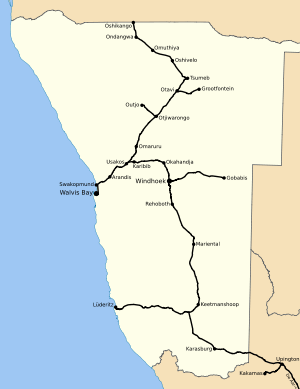TransNamib
TransNamib is the railway State-owned enterprise of Namibia. Organised as a holding company, it provides freight by rail and road as well as passenger services. Its administration is located in Windhoek.
Two TransNamib U20C (South African Class 33-400) diesel-electric locomotives haul a train south of Keetmanshoop |
History
A first local railway was constructed in 1895 by the Damaraland Guano Company for commercial purposes. The first public railway, and the core of the present system, was constructed by the German Colonial government. The 383 km connection between Swakopmund and Windhoek was inaugurated on June 19, 1902. The German colonial railway was taken over by the Railways of South Africa after World War I, and linked into the network of South Africa. After the independence of Namibia, TransNamib took control of the national rail network.
Operations
TransNamib operated 2,883 km of rail in 1995. Since then, further track has been added to the network through the Northern Extension. It operates on 1,067 mm (3 ft 6 in) Cape gauge. While focus has been primarily on freight services, passenger services are an important component of TransNamib and provided under the Starline logo. The “Desert Express” is a tourist train to link Windhoek and Swakopmund.
The TransNamib Railway Museum is situated in Windhoek.[1]
In early 2011, the Karasburg - Ariamsvlei mainline was damaged by flash floods, as was part of the Seeheim-Lüderitz line; services were suspended.[2]
Major lines and stations

- Windhoek-Tsumeb/Walvis Bay
- Windhoek Railway Station
- Okahandja
- Karibib
- Omaruru
- Otjiwarongo
- Tsumeb
- Northern Extension:[3]
- Winhoek-Gobabis
- Windhoek-Upington
See also
References
- "TransNamib Railway Museum | Windhoek | Namibia". www.namibweb.com. Retrieved 2017-08-17.
- "NAMIBIAN WASHAWAYS". Railways Africa. Retrieved 2011-02-19.
Seeheim-Lüderitz
- Update 2006 re Northern extension